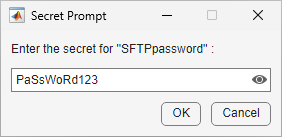getSecret - Retrieve secret value from MATLAB vault - MATLAB (original) (raw)
Main Content
Retrieve secret value from MATLAB vault
Since R2024a
Syntax
Description
getSecret([secretname](#mw%5Fb9d61e32-88aa-4013-b5da-4ea101000d41)) retrieves the secret value with the specified name from your MATLAB® vault. Your MATLAB vault is accessible only from the exact combination of your operating system account and local machine.
[v](#mw%5Fa68e89cd-1cfe-4d6b-bb23-3139109fde2e) = getSecret([secretname](#mw%5Fb9d61e32-88aa-4013-b5da-4ea101000d41)) assigns the secret value to a variable. Displaying the variable value makes the secret visible.
Examples
Retrieve a secret value from your vault.
getSecret("ExamplePassword")
Retrieve a secret value from your vault and assign it to a variable. Note that assigning a secret value to a variable makes the value visible.
SFTPpassword = getSecret("ExamplePassword")
SFTPpassword =
"pass_word123"Create a secret to store your SFTP server password by initiating the Secret Prompt dialog box with the name of your secret.
setSecret("SFTPpassword")
Use the dialog box to set your secret value and add the secret to your MATLAB vault. Toggle the eye icon in the text box to hide or show the characters in your value.

To provide the SFTP server password, use the secret from your vault containing the password value.
s = sftp("sftp.example.net","adam",Password=getSecret("SFTPpassword"));
Input Arguments
Unique case-sensitive text identifier for the secret, specified as a string scalar or character vector. You can use a secret to hold sensitive information, such as passwords, certificates, credentials, OAuth tokens, and other configuration data for:
- SFTP and FTP servers
- Password-protected files, such as PDFs
- Password-protected archives, such as zip files
- Cloud providers, such as Amazon S3™ and Windows Azure® Blob Storage
- API keys, SSH keys, and encryption keys
- Databases and applications
Output Arguments
Secret value, returned as a string scalar. Assigning a secret value to a variable makes the value visible.
More About
Your secrets are stored in your MATLAB vault, which is accessible only from the exact combination of your operating system account and local machine. Your vault and secrets, which do not leave your local machine, persist across MATLAB sessions. Each secret consists of a name, value, and optional metadata.
- Secret name – A unique case-sensitive text identifier for the secret. The secret name is stored unencrypted in your vault as a string scalar.
- Secret value – A text value associated with the secret. The Secret Prompt dialog box, where you enter the secret value, supports copy-paste functionality. The secret value is stored encrypted in your vault using industry standard AES-256 encryption. The secret value is returned as a string scalar.
- Secret metadata – A dictionary containing additional information associated with the secret. The optional secret metadata is stored unencrypted in your vault.
To set a secret, use setSecret.
For increased security when you use MATLAB Online™, enable two-step verification for your MathWorks® Account.
Extended Capabilities
Version History
Introduced in R2024a
The secretname argument now supports the forward slash character (/).
This function supports thread-based environments.